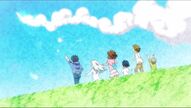Those who left in a hurry with remnants of the world, their unexpressed emotions and words that were too late to speak may only be sealed in history in reality. From this point of view, Mianma may be lucky, at least she can "goodbye", say goodbye to her "goodbye" everyone, and convey the love of being a daughter-in-law to Rentai. It can be said that my tears are far more than shedding for the regret that such a kind and innocent girl lost her life at such an innocent age. In fact, "the emotion I want to convey the most. But helplessly unable to convey" This is what hurts my heart the most. The keyword "helpless" does not refer to the kind of courage that can be done but can't do it, but can't be done because of the loss of all ability to act.
But then again, from a materialist point of view, after death, people must have no ability to think, so the last ones who are affected are those living people who are connected with her. At the end of the work, it briefly describes the life of the partners after the farewell, which can be said to be a relatively relieved state. Although some sadness is inevitable if I really want to reminisce, it also reminds me of the classic sentence in "Children Chasing the Stars": "Live with loss." Probably so.
The number of words actually exceeds the short review, and I actually don't want to say more, but this book does have a lot of things that can be discovered. I have picked some of the things I liked above. Not much, but I still hope that when I leave, there will not be so many words left to finish.
View more about Anohana: The Flower We Saw That Day reviews











